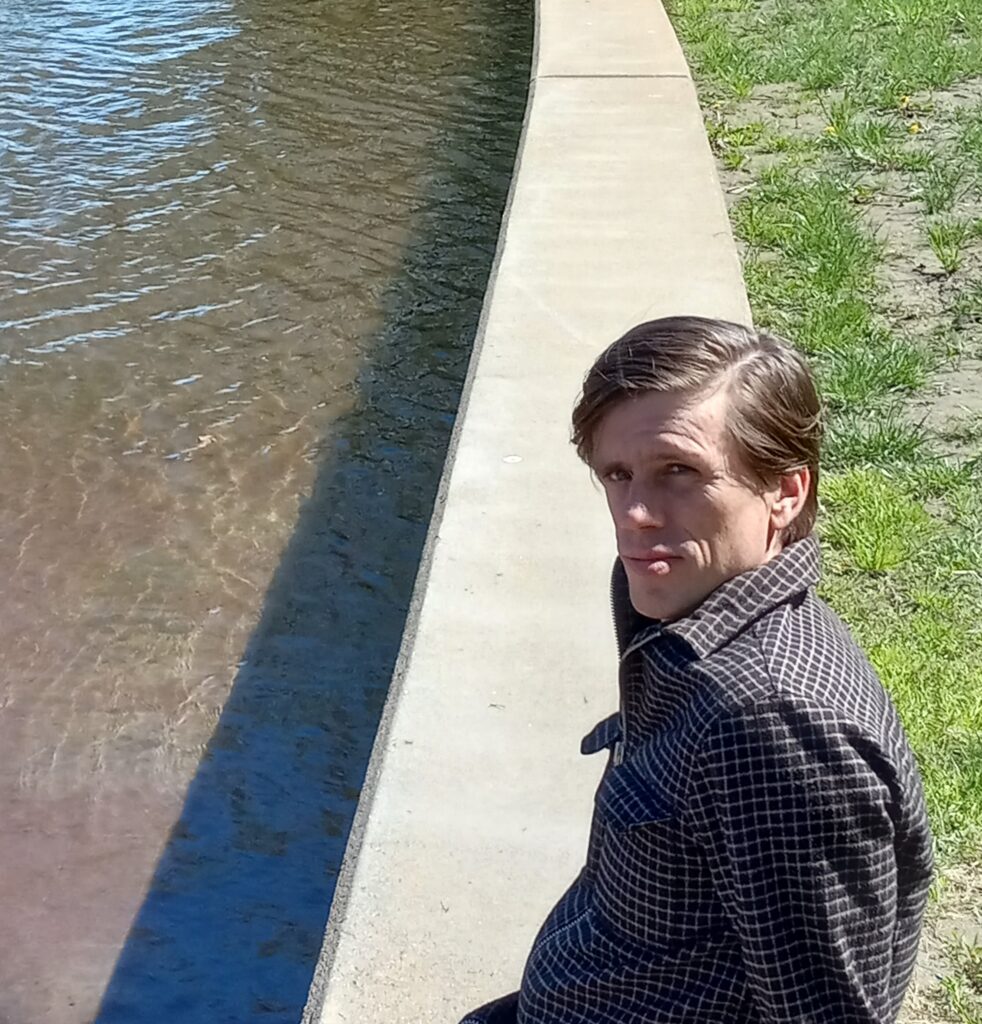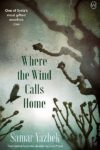
David Larsen’s first poetry collection, The Thorn (Faux Press, 2005), arrived during the early years of the second Gulf War, and its keyed-up, indignant poetics made a large splash in a bicoastal intimate pond. Now, after seventeen years of publishing exclusively as a scholar-translator of premodern Arabic literature, Larsen has released Zeroes Were Hollow (Kenning Editions, December 2022)—a fever dream of epic disjunction, where stone inscription runs into hasty scrawl, and eso-/exoteric knowledge is caught dripping in abandon, like true Etruscan vases adorning a dive bar.
From St. Petersburg, Florida, I interviewed David in Abu Dhabi, where he is a research fellow at the Library of Arabic Literature. The date was April 28, 2023.
Tenaya Nasser-Frederick: It’s been seventeen years since your last collection of poetry. If The Thorn outlined a site of nascent activity, Zeros Were Hollow feels like a snapshot of the city which gradually came to swallow that site. The “Despot’s Tale” has replaced “The Pancake Vendor,” the freakishness of “The Diviner Satih” is now acknowledged as the author’s own, and in place of “On Melodrama” are melodramatic statements. Whichever coterie the book is addressed towards seems also to have expanded. Zeroes Were Hollow is perhaps more emphatically directed towards other translators, other translator-poets and historians—if only in the sense that Zeroes seems to unify the offices of historian and poet, insofar as the historian describes, and the poet enacts.
I guess I didn’t end that with a question mark. But if you have any thoughts on that assessment or characterization it would be great.
David Larsen: It’s extraordinary to hear so much laid bare. First of all, to the relationship between Zeroes and The Thorn: The Thorn was very unplanned. It kind of came all in a rush, although it did contain material that went back about ten years. Zeroes has some of that, but it’s also kind of like a workbook, you know? I gave myself assignments. I don’t have a workshop background, so my prompts are really rudimentary, like, “Reflect on your own death,” or “What would the devil sound like if you had to write lines for him?” That kind of thing. And there’s a lot in Zeroes that was unplanned also. You mention “On Melodrama,” and the micro-essays that were in The Thorn. I really wanted to have essays in Zeroes, but I couldn’t think of any. I’m working in too much of a long-form kind of prose now, and I couldn’t make the micro-essay happen.
Well the impression I got is that the essay “On Melodrama” is enacted in Zeroes Were Hollow through verse lines like, “I am here for you / but not when you’re like this.” That kind of thing.
[Laughs] You could say “On Melodrama” was a position piece. Remember, I came up in the nineties, when the generation immediately preceding us in the Bay, I mean the Language poets, were not given to great emotional display. Or at least that was the way we represented Language poetry to ourselves, and so it was great fun to overthrow all of that. And in that sense I came along at the right time, because I never could have exercised emotional restraint. I mean I’m an emotive person. So “On Melodrama” was my way of admitting that, and also throwing down, not a gauntlet exactly . . . But I think it’s fair to say that Zeroes is acting on that permission slip that I gave myself seventeen years ago, and doubling down. I mean, tears! From a grown man. One of the first things they tell you not to do in a poetry workshop.
But you also have a way of misspelling tears as “tiers,” T-I-E-R-S.
Oh, yeah, that’s a pet peeve of mine in English. I did that to disambiguate “tearing up” from “tearing up,” as in ripping. Which, on the page, look the same. Another word like that is wind. It makes me not want to use the word at all.
“Tiering up,” though—you’re talking about the “Hymn to Hades,” that was unplanned too. That’s a very old poem, from like 2006 or 2007.
I’m talking about the one where you’re “tiering up in McDonald’s.”
Yeah, that was on Potrero Hill.
Oh really! Now, I want to do something with music right at the start, because there’s another line in that poem which goes: “Music instead of emotion is my take on it.” And there’s another line [in “Columbus, O”]: “with no music for 100 miles,” where you create this kind of distortion, instead of “stops” or “people,” replacing it with “music.”
That’s another autobiographical note. It originally said, “no water for a hundred miles,” because on Highway 50, in Nevada, there are these hundred-mile stretches where there’s no water. You have to carry your own. I was on a bicycle.
Ohhh, because I was wondering what “music” was displacing.
Food and water. It’s an appealing swap, because it suggests that there are gaps in life that aren’t musical. And what else is poetry supposed to do but fill those? I don’t know. But the fact that music is important to me does not make me special. Every human being, whether or not they’re an artist, is hooked on music. I don’t think there’s anyone that doesn’t take it personally. In my case, the case of Zeroes—one permission slip I never gave myself was to be unmusical. And this goes for my presence as a reader and performer of poetry. I’m an entertainer, of sorts, and a kind of a ham. What I really have, though, is a lack of entitlement. If it’s not fun to listen to, then I don’t feel that I’ve earned my place at the mic. So naturally, the poems reflect that, because I write for performance, and the books are repertoire, in addition to whatever planning has gone into putting them together.
I wanna emphasize the tension, or the contraries that I find in Zeroes between—maybe not music and emotion, but between music and a kind of sentimentality.
Maybe here’s where I cut you off, because sorry. How is music in any way opposed to sentimentality?
I was just wondering about the line, “Music instead of emotion is my take on it.” Or also, when you’re talking about a performance in terms of a lack of entitlement, I wonder if it’s a resistance to sentimentality.
You know, now that I think about it, walking away from entitlement for a second—that swap does make sense: music instead of emotion, that when the emotional experience is turned into a musical one, it conveys emotion to other people, but for the artist it brings—what else but joy in the well-made thing? So the saddest lines, if they’re well done, that’s a form of metabolism, or at least that’s the way I metabolize a lot of negative experience. Like the one in—what’s the poem? It’s got a very long title. “Required Reading for the Geniuses of the World.” That’s describing a terrible experience. But it makes me smile every time I read it. And that’s not a unique case. So I have no problem saying that poetry is therapy for me.
Well, I wonder if you are hyper-localizing your poetry through retaining a particular diction in the line breaks. As in local to your manner of speaking. You sometimes over-extend the first line and truncate the second line, creating a slant emphasis in the couplet, or something like this.
True, it’s mimicking speech. You could say the same about the handwriting, which isn’t just mimicking my handwriting but is my handwriting.
It puts a premium on performance while being so distinct from slam or spoken word poetry.
I am sympathetic to slam poetry, and for the same reason: that it’s using the idiom that we know to be, among other things, for entertainment. A popular idiom, that’s very close to rap.
You know what, our friend Julian [Talamantez Brolaski] just gave a Bagley Wright lecture at the Poetry Project. I won’t do justice to Julian’s thesis, but it was very much involved with rap, as well as Middle English, considering rhyme as a basis for believability, authority as communicated through mastery over rhyming forms. It makes me want to ask you about rhyme in your work, rhyme in relation to what I’ve noticed about Zeroes, being that it seems very concerned with craft, in references to poetry as a form of labor, in asserting that a poet’s induction is similar to a union membership, etc., but there is an equal emphasis placed on what’s rare, and of high quality. The poems, perhaps by embracing both, tend both toward high- and low-end commodity production—guilds and factories, if you will—in favor of the ascetic or the fool. So I wonder how you conceive of craft within the context of burlesque—if burlesque is a large part of your relationship to rhyme, in terms of the doggerel of mismatched rhymes with mismatched rhythms.
It’s funny, I need to be reminded that I’m a poet that uses rhyme, because that’s not my identity. I used to actively avoid it, even in translation, where the material I translate from is rigorously rhymed. Julian is much better equipped to talk about this—its dissertation was on rhyme. And if I’m being honest I kind of followed Julian into it. For me, I guess it seemed that to hold back on rhyme would be ungenerous. Because, look, I have a talent for it. I’ve always been able to come up with funny rhymes. But that was nothing to be proud of in our scene. It wasn’t a skill that was admired. But now I have to say, it really facilitates the hearer’s satisfaction, especially at the end of a poem. “Hoofprints in the Snow” used to have no rhyme, until I was like, “No, you’ve got to rhyme cymbal and nimble, and then you’re out,” so people would know the poem’s finished, and that the ending was intentional. And I’ve always been sympathetic to internal rhyme. Alliteration, a little less so . . . But you’re right: Rhyme is craft, and there’s times when I feel like an artisan in a dirty smock, turning out these things.
The piece at the end of the book, which is the outright doggerel—that was another assignment I gave myself. There were different impulses behind it, mainly to end on a comic note that wouldn’t undermine the seriousness of the book. And to commit, totally, and do it all the way in these rhymed couplets. It took a lot of planning; I don’t know if it shows.
Would you say that Zeroes is anti-craft?
No, because—back to the dirty apron—it’s a lot of work, with a hand-tooled end-product. Another way to know the craftworker is by their active gag reflex. You need one, because when something’s not working in something you’re making, it should make you sick. That sounds kind of negative, doesn’t it? But I do have a positive take on technique. Those might be two words for the same thing, technique and craft, I don’t know. One thing about technique, though? Technique is traditional. There may be experimental technique, but in that case it’s on its way to becoming conventional. You know what I’m saying? You can have experimental flair, but if you’re employing technique, then it’s proven to be efficacious. An experiment that succeeded. Otherwise it wouldn’t be a technique, it would be something else.
I’m thinking of what you said about the comic note or the serious comic. In “Aftermath in American Rhymes,” you have this beautiful line that I get fixated on about persona: “Something happened to mine / It has no cheek to hide my tongue / The skeleton’s face was badly done.” It’s a great line, and it sent me back to something from Nietzsche’s Beyond Good and Evil, where he says, “There is not only deceit behind a mask, there is so much goodness in craft.” I thought it was very emblematic of Zeroes generally.
He was probably thinking, as I was, of the persona as an instrument of the tragic theater. It’s Latin, of course, for something you have to speak through: per + sonare. It’s no rare insight to say we’re all walking around with masks stuck to our faces, but I’m glad you bring it up, that I do have an acutely asymmetrical face. There’s more than one thing wrong with it; everyone notices something different. My whole existence is performed through a very special channel, and this involves contrary movements. Erving Goffman says the stigmatized person oscillates between cowering and bravado, and that’s accurate as hell. It makes it easy to revert to a sneering clown figure, as much as I hate to admit that—but a clown who resents their own gift for humor, which never has happy roots. What can I do? It was thrust on me. At some point I will obviously have to write about it, and it won’t be a micro-essay, either. Until then, it’s inevitable that the bad vibes will filter through the work, obscurely or not. And I have to filter through it too, which is the whole point of persona.
What was the question again? Oh, that poem. “Aftermath in American Rhymes.”
I’ll quickly say, since you mentioned Nietzsche, the two inspirations for it. One was The Gay Science, which begins with something called “A Prelude in German Rhymes.” I forget how many there are. The first ten or twelve are not bad, and after that they kind of fall apart. But there’s a great one in the middle called “My Callousness,” that is referenced in my line about “a hundred steps.” And of course the title, where “Aftermath” is the antonym of “Prelude.”
There’s also the poem by Ibn al-Maghribi that ran in the Brooklyn Rail that I translated, that also is a stanzaic sequence where the poet is boasting of or confessing to all these vices and misbehaviors, and the transitions in that poem were so great that I was really following the lead of this genius from the thirteenth century that no one else has heard of. That’s no one’s fault, because his work became dispersed. He had an actual diwan, an edition of his collected poems, compiled in his lifetime. But now all the Ibn al-Maghribi that you can read is in biographical dictionaries, and I’m making kind of a slow-motion effort to collect and translate all that.
Anyway, that’s the genesis of “Aftermath,” or the model for it. In case you’re wondering, do I walk around reciting it to myself? Absolutely, because it’s so easy to remember. And that’s what rhyme is. Everyone knows this. It’s pre-literate information technology. Authoritative it may be, but that’s a side effect. I think. Primarily, or primordially, it’s easy to repeat, and “play back,” and I think its authority derives from that.
It would be interesting to talk about this with Julian. I am reluctant to embrace the authority of rhyme. I remember an essay by Robert Hayden, where he was undercutting rhyme. He makes the point that just because a statement rhymes doesn’t make it true.
There’s also “The Palm,” with the Ibn al-Rumi translation that shows up in Zeroes, which embodies a funny kind of philosophic stance on value or reproduction perhaps.
Uh, yeah, that’s a rhymer, is it not?
Yeah, “wither” with “winner.”
[Recites] “A palm tree is slow to give back to the planter. / But a happy return is assured when the leaves start to show. / Time sustains the palm when other stumps wither. / In a race against wheat, the palm is the winner.”
Okay, so not exactly rhyming. But I prefer that kind of near assonance to the real thing.
That was during the summer of 2019 in San Diego, when I was so glad to be back where there were palm trees. Ibn al-Rumi, by the way, is not the well-known Mawlana Rumi, but an Arabic poet of the ninth century, and it’s hard to classify his work. My friend Adam Talib wrote a whole book about how there’s no such thing as epigrammatic poetry in Arabic, or that you can’t rightly call them epigrams. Otherwise, that’s how you’d describe a lot of Ibn al-Rumi’s output.
It’s funny, between translating those four lines, that might have been the first time I adopted rhyme in translation. As if it were a proper epigram, which benefits from that authority function of rhyme to achieve its effect, or requires it. So I think that’s why I did that. Looking back, it might be a major turning point, dropping my resistance to rhyme in translation. And then the poem I used it as the epigram for is completely rhymed. And that was spontaneous.
I didn’t realize I’d have this much explaining to do where rhyme is involved. Because I don’t have a program. I don’t have a thesis. If I taught Creative Writing, I would never tell students to use rhyme. In the case of “The Palm,” it falls into two halves: the epigram, which does have wisdom, and the poem which has none.
I guess what appeared radical to me about it was the slowness of exchange that the palm represents, and poetry as, how did you put it? A preliterate information technology which still exists today?
Could we be confusing longevity with slowness? Because that is what we’re talking about, the longevity of oral tradition, and how it preserves, like—you know, I heard a talk only last night by Martin Schwartz, whom I never took a class with at Berkeley, but have gotten to know since then. He gave this amazing talk about how the material in the Gathas that is the actual poetry written by Zoroaster, how it held together through oral performance, where the usual assumption is that the poem is being recomposed every time it’s performed. But Martin Schwartz has the receipts, and he’ll show you how through these oral acrostics, and something he called “SCRIM” (Serially Correspondent Recursive Intertextual Mechanics), the text remains stable. So it’s accurate to call it technology, because these are techniques that are not only mnemonic, but mystagogic. And that was a title word in Martin’s talk.
Mystagogic?
Yes, leading the hearer and the speaker into mysteries.
As a translator, are you concerned with the translatability of your own work? Do you ever try to skew the translatability of your own work?
Such a great question, such a great question. I never thought my work would be translated, though I know people that’s happened to. But it doesn’t resist translation; I mean, I think it would be easy to pull off. Sometimes it happens outside the English-speaking world that authors are accused of writing “for export,” writing stuff that’s destined to be more popular abroad than at home. I won’t name any names, or any countries even, but to me that’s not really a vice.
Let me put it this way. I don’t think about translatability for myself, but as a translator of Arabic I do think about readers for whom English is a third or fourth language. That is an imperative. There are many stakeholders in what’s written in Arabic who don’t read it. I don’t want to come off with a savior complex on this, but I’m told that over half the Muslim world relies on translation for reading literary Arabic. I can’t say that’s a statistical fact. But it does inform my choices as a translator.
Not that I hate that kind of thing on principle. Have you seen Pierre Joris’s translation of Tarafa? From the suspended poems, Tarafa’s suspended poem. It’s great experimental work, very asyntactic. Obviously, he was working from a prior translation, Arberry’s probably. [CORRECTION: Joris worked from multiple sources (none of them Arberry) as disclosed in his interview with Alexis Almeida.] But I owe the world as much clarity as possible, and not making it unnecessarily difficult to read. So as a translator, I’m not an experimentalist. What I have is technique.
And maybe that is true for some of the original poetry as well. In spite of myself, I pretty much use grammar. I pretty much use normative syntax. Maybe that’s not true. You mentioned the line breaks—they kind of shake things up a little.
You have a lot of distorted instances and moments—what I was referring to as distortion—where there are grammatical switcheroos, or objects taken out and replaced with other things. But at the same time it’s like, you know, one can definitely commend you on its readability and accessibility.
Thanks for saying that. Remember when I read with Christina Chalmers? She mopped the floor with me. Obviously I was bringing an older form of entertainment, that you wouldn’t necessarily recognize as coming from an avant-garde poetry community. Some variation on “bringing a knife to a gunfight,” which wasn’t a fight, of course—but definitely bringing the vaudeville. Vaudeville versus what’s happening now. I have committed to inhabiting outmoded forms, more or less. And how could you not, if you came right after Language poetry? Language is broken, huh? All right, let’s play on this busted piano, then.
[This interview continues with Part Two—to publish on Friday of this week.]
Tenaya Nasser-Frederick is a poet from San Francisco currently based in Brooklyn. He is the author of the chapbooks Lavender Cats (1080 press, 2020) and Penumbra Highway (Gas Meter, 2018).
This post may contain affiliate links.







